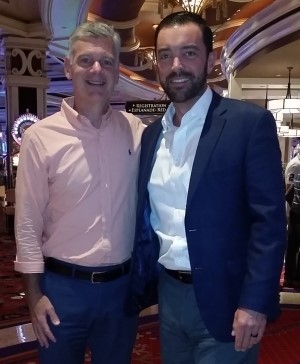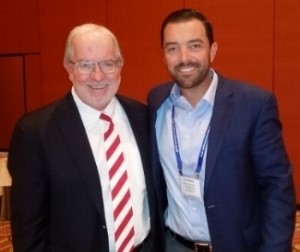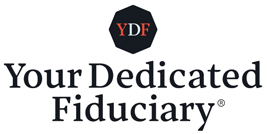
Mark Yusko (left), Vance Barse (right), at the FA Inside Alternative Investments & Asset Allocation Conference in Las Vegas, September 24, 2018.
It’s been a decade since the collapse of Lehman Brothers and the “Great Recession” of 2008. Today, the stock market keeps notching new highs, consumer confidence is at an all-time high, unemployment is around an all-time low, and Uber drivers are touting marijuana stocks instead of that “Bitcoin thing.”
The highs and lows of the economy, and how we tend to minimize the inevitable cycles of markets, was very much on my mind at the recent Inside Alts conference in Las Vegas, where blatant excesses are conspicuously displayed for all to see, like some aspects of the current U.S. economy. This conference was a wonderful opportunity to hear some of the industry’s leading figures share their perspectives, reconnect with colleagues from my former career, and get a pulse on current happenings inside the “alts” industry.
Prior to becoming a wealth strategist, I spent nearly a decade consulting leading financial advisors around the country on how to implement alternative investment and absolute return strategies into their clients’ portfolios.
At a high level, alternative investments have historically had low- or near-zero correlation to the S&P 500 and have been used as diversifiers over longer timeframes and market cycles. In non-propeller head speak, this means that alternative investments have historically had returns that behave independently of the stock market.
Absolute return strategies, which are a subset of alternative investments, strive to hedge your portfolio by taking both long and short positions on what they trade, such as stocks. Because absolute return managers can short, many of them have the potential to reduce downside risk in stock and bond portfolios during periods of economic duress such as the Tech Wreck of ’00 – ’02 and the Credit Crisis of 2008.
The alternative investment and absolute return landscape is quite large and intimidating if you are not familiar with the space. Even for me, a former alternative investment consultant, there is a seemingly unending barrage of emails and calls from firms—large and small, old and new—announcing their latest and greatest in this area.
Here is a quick list of sample alts you may find value in learning more about:
Alternative Investments
-
Private Equity
-
Real Estate
-
Timber
-
Precious Metals
-
Equipment Leasing
-
Farmland
Absolute Return Strategies
-
Long-Short Equity
-
Long-Short Credit
-
Equity Market Neutral
-
Managed Futures Trend Followers
-
Merger Arbitrage
-
Global Macro
For a closer look at some of these strategies, please click here to read “Remembering 2008: Portfolio Considerations for Volatile Markets”.

Dennis Gartmen (left), and Vance Barse (right), at the FA Inside Alternative Investments & Asset Allocation Conference, Las Vegas, September 24, 2018.
The two keynotes for the second day of the conference were Mark Yusko, Founder, CEO, and Chief Investment Officer of Morgan Creek Capital Management, and Dennis Gartman, author of a well-respected financial newsletter and frequent commentator on the markets. These two have engaged in thematic debate before, but this time it was different: they actually agreed—a lot—except on investing in cryptocurrencies. Gartman deemed Bitcoin a worthless commodity whereas Yusko suggested that cryptocurrencies will eventually become global currency. Interestingly, Gartman sported the no socks business attire for which he is known while Yusko donned bright orange socks in honor of his alma mater, Notre Dame. I was wearing “colorful statement argyle socks” that matched my dress shirt and suit – after all, this industry could use a little personality from time to time.
FA Magazine did an excellent job hosting this enlightening conference, with notable panels hosted by Evan Simonoff and Christopher Robbins. I was surprised by the small number of financial advisors in attendance. I guess the advisor community isn’t focusing on alts right now while times are good. This situation reminds me of 2007 when advisors told me they had little or no interest in using alts for their clients’ portfolios. That stance changed dramatically after the 2008 crisis.
Is now the time to get hedged?
In my opinion, if wealth preservation is part of your investment objective, you may want to consider implementing alts as satellite holdings now. For wealth preservation clients who are still working, I am implementing long-short equity, merger arbitrage, and equity market neutral strategies. For wealth preservation clients who are retired, I am incorporating merger arbitrage, equity market neutral, and long-short credit strategies.
Should certain indicators suggest the economy is entering a recession with downward pressure on stock valuations, I will incorporate managed futures trend following. Given current stock market valuations, rising interest rates, the apparent end to the 37-year bull market in bonds, record federal debt, so-called dual deficits, and the potential for trade spats to evolve into a trade war, hopefully your advisor is talking with you about these strategies now.
There’s one thing I firmly believe, though: this conference will likely be standing room only the year after the next recession, whenever that may be.
Disclaimer: please consult a qualified advisor with expertise in these strategies to evaluate if they may be suitable given your investment objectives. Please also consult a qualified CPA regarding the tax implications of investing in these strategies. Please consider using fee-based, instead of commission-based, share classes of these strategies where available. Investing in alternative investments may not be suitable for all investors and involves special risks, such as risk associated with leveraging the investment, adverse market forces, regulatory changes, and illiquidity. There is no assurance that the investment objective will be attained.
D. Vance Barse is an investment adviser representative with and offers advisory services through Commonwealth Financial Network®, a Registered Investment Adviser.
